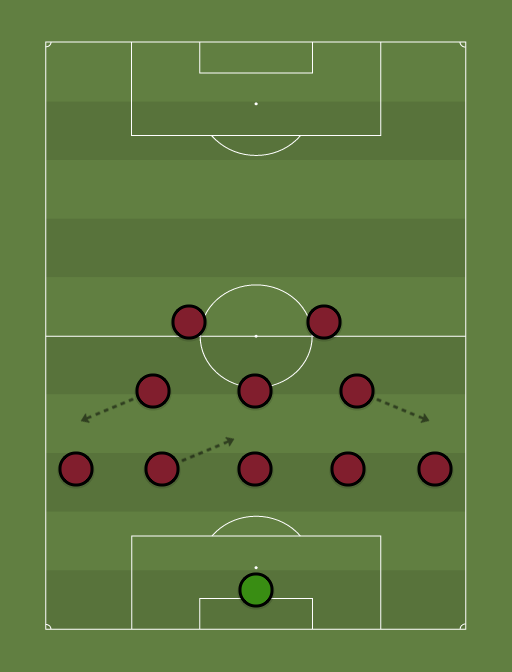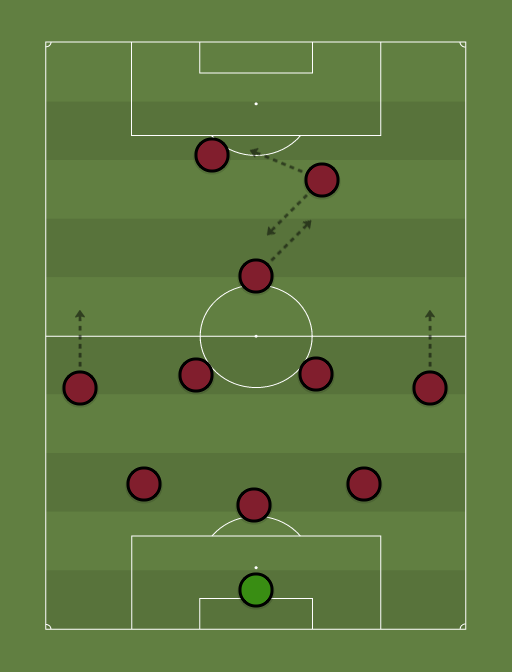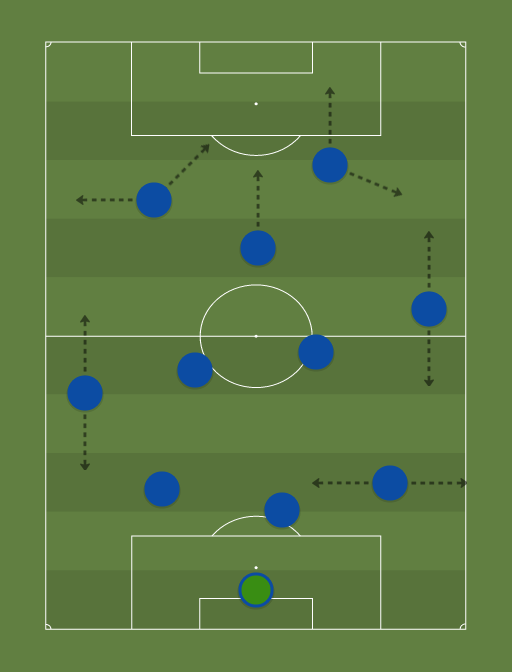All players shall be judged only on their performances at the tournaments (From 1927 to 1960 the CEICs, from 1960 to 2012 the Euros). Please take this into account before voting. You can read up on the theme by clicking here.
-------------------------------------------------------------------
Team ctp:
„Attack wins games, defence wins championships“-------------------------------------------------------------------
Team ctp:
In the spirit of that quote I’ll start with my defensive set-up:
At the start of the game:

Quickly reacted a few minutes into the game:

Joga has some very dangerous strikers, but I feel my defence matches up well against them. My team will keep a compact shape, a tight 5-3-2 with Mazzola dropping in between Nausch and Ocwirk. I’ll leave his centre backs undisturbed on the ball and start putting pressure on his midfielders as they receive the ball. Kluivert and Rummenigge will be on Pluskal and Effenberg to try and win the ball back with the three in behind closing off passing lanes.
At the heart of my set-up is the back five, marshaled by Gaetano Scirea, whose Italy conceded not a single goal in the group stages of the 1980 Euros and just a single one in the third place playoff. He is supported by England captain Tony Adams, who had a fantastic 1996 tournament (apart from conceding a pen vs Scotland), and Portuguese legend Fernando Couto. My defence is completed by two fantastic wingbacks, who are both excellent defenders and dangerous attackers. On the right, it’s another 1980 stalwart in Eric Gerets, the main man alongside Ceulemans in the Belgian side that finished runners-up. On the left, it’s the only Euro champion in my defence, Frenchman Bixente Lizarazu. He played as an orthodox left back in France’s successful Euro 2000 campaign, but he is equally adept at wing back, as he demonstrated in Hitzfeld’s Bayern side.
This defence will be able to cope with threat from the wings, as my wing backs will have the support of the centre back next to them or a defensive midfielder moving wide. Both, if necessary, in case one side gets overloaded. The centre will be closed off even further, with three strong central defenders and three midfielders in front.
If all that isn’t enough, I have young José Ángel Iribar in goal, who was talented enough to become Spain’s first choice goalkeeper at the tender age of 21, and was thrown in right at the business end of their Euro campaign (QFs). He conceded only two goals in two games at the final tournament, and showed a number of strong saves to deny the Soviet strikers in the final.
Not sure how Joga is going to line up his strikers, but I have a special plan prepared, if he plays Sindelar as a false nine. In that case Scirea is to move more to the left to cover for Couto, who will have a semi-man-marking job on his hands and is to follow Sindelar into midfield and put him under pressure any time the ball reaches him and to combat the numerical advantage he would give Joga’s midfield.
Defensive transition
Nothing special, really. No counter-pressing, just everyone back into position, taking care to close off passing options for counterattacks wherever possible.
Attacking transition
I have a good team to hit Joga on the counter if he loses the ball high up the field. Gerets and Lizarazu on the wings, and Mazzola, Rummenigge and Kluivert up front are all quick players, and I have some fantastic passers who can find them with a quick ball from the back in Scirea and Ocwirk especially.
A nice interception at the back, a quick pass to Ocwirk, a long ball for Gerets to run onto, a quality cross, a Kluivert header. A perfect counter that my team is well capable of.
If no counter is on, my team is comfortable attacking with a slower, more possession-orientated approach.
And we’re at the attacking set-up:

My attacking set-up will be a rough 3-4-1-2. Gerets and Lizarazu move up to past the central midfielders in possession and make runs at the opposing full backs if necessary. Nausch and Ocwirk will be the playmaking platform, Mazzola the AM, with Rummenigge and Kluivert upfront.
The plan is to use good pass-and-move football to drag Joga’s defence out of position and create space for my fantastic attack to exploit. At the heart of this approach is my Austrian midfield duo. There’s Wunderteam captain Walter Nausch, who was a constituent part of that team’s “Scheiberlspiel”, exactly the kind of passing football I’m looking to implement. His partner is Ernst “Big Dunc” Ocwirk, who was discovered by Nausch’s midfield partner Smistik and declared his successor. Ocwirk is a complete midfielder, but the outstanding part of his game is his passing, especially diagonals and long balls over the top of the defence. His job will be to find the strikers with a through ball or a ball over the top after the pass-and-move game has created such an opportunity. Ocwirk was named the best player in Europe by France Football in 1952 and captained a Rest of the World XI against England in 1953 and 1954. Both are CEIC players, and their performances in that tournament are uncertain to a degree, so we’ll have to assume they displayed the level of quality they received accolades for in those games.
My attacking midfielder is Inter legend Sandro Mazzola. A Euro champion in 1968, his role is to create chaos in Joga’s defence, my “wild card” in attack so to speak. He is a quality passer of the ball and fits the general approach of my attack, but his main job is to use his mazy dribbling to beat defenders and draw more attention and players to himself, and as such open space for my strikers. He also has an excellent goalscoring record in general, so he’s definitely a threat with runs into the box, but he didn’t score at the Euros so I don’t know how much that is worth.
Upfront Rummenigge and Patrick Kluivert will score goals for my team. Both are very versatile forwards, but Kluivert has more attributes of a classic centre forward and will thus have the job of occupying Joga’s defenders and keep them pushed back. Kluivert is the opposite of Mazzola in that his goalscoring record at his Euro 2000 peak is much better than usual, scoring five goals in five games when he was generally more of a one in two striker. He will be a major goal threat with either foot or his dangerous headers, but also able to find a teammate with a clever pass in the box.
Karl-Heinz Rummenigge will play as a second striker around Kluivert and use his fantastic allround abilities to create and his striker’s instinct to score goals. In a team studded with stars he is perhaps the outstanding player, inspiring Germany to the Euro 1980 championship. He also won the Ballon d’Or that year for his performances. In the game he will often drop back into the number ten position, with Mazzola, the natural inside right, taking over his position. That movement is intended to disrupt Joga’s defence and hopefully create an opening for Rummenigge to exploit. If nothing else works, he can also find Kluivert’s head with a corner, like he did Hrubesch in the 1980 final.
Last edited:



 as I really like the look of ctp's team and it is tactically spot on. In what promises to be a close match, I just believe my defense could prove to be the match-decider though. Good luck ctp!
as I really like the look of ctp's team and it is tactically spot on. In what promises to be a close match, I just believe my defense could prove to be the match-decider though. Good luck ctp!